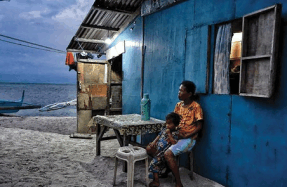
ON 3 MARCH 2020, I boarded the pink line of the Delhi metro and headed to Maujpur, a suburb in the north-eastern part of the city. The metro coaches were sparsely occupied, and there was only a small trickle of people at the station, which was unusual for a Tuesday morning. Outside was a small group of members and volunteers working with ANHAD, an NGO that was coordinating relief work in the area. We split into two groups and set out. My group comprised four people: Tarun Sagar, a social activist working with ANHAD who was organising the relief effort, another ANHAD member, a journalist and me, a lawyer. We were slated to visit affected families in Shahdara, Jaffrabad and Kabir Nagar, the neighbourhoods bordering the epicentre of the riots in the previous week, which claimed, according to official estimates, 53 lives.
If it were not for the deployment of Rapid Action Force personnel at every chowk and corner, or the precision with which specific shops on the main road had been burnt down while adjacent ones were left unscathed, it would have seemed like a normal day. The helmet stores and garment shops on the serpentine streets winding through Kabir Nagar seemed undecided as to whether or not they were open, but the small food joints proclaimed their thirst for business quite cheerfully.
We wound our way past the tightly packed gullies, ringfenced with an open drain, until we reached the home of a woman who had lost her son at the height of the violence. He had been shot in the stomach on 25 February 2020 and died several hours later in a government hospital that had initially refused to treat him. It was not difficult to identify her when we arrived on her street. She was seated outside, surrounded by a small group of men and women. No one seemed to be speaking. On seeing us, she immediately went inside to bring out chairs, which were placed on the street and dusted off with her dupatta before we were invited to sit down. She had a look on her face that we had seen in many of the inhabitants of other houses devastated by the riots: a calm disbelief in the reality thrust upon her that can only be achieved after days of weeping.
She repeated her son’s name several times and said that he had been an entrepreneur who dreamed of building a successful business. He was just 24 years old, had two young children and a young wife, who was now in iddat. Shortly before they all heard the sounds of rioting in the adjacent maidan, she continued, he had stepped out to buy something. He was shot, and his friend carried him home. The neighbour’s Maruti van, which was used to transport him to the hospital, still bore smears of his blood. The family felt that the hospital had not given him adequate attention; attention that might have eased his final moments, if not saved his life. There had been a lot of trouble getting the body released.
What can you say to someone whom the state has failed in every way possible? We found ourselves providing brittle legal advice of the kind that they must have heard a dozen times over the last week. We accompanied the family to the Jyoti Nagar Police Station to get a copy of the first-information report pertaining to the death and eventually received a document that did not even spell his name correctly. After helping them put together documents to make a compensation claim, we left, feeling rather useless in the whole scheme of things. Ayub, their neighbour, the one who had carried the dying man in his arms on the way to the hospital, accompanied us to Maujpur station.
The right of self-defence is an inadequate right, carrying a history of racist legislation, inconsistent application by trial courts and weaponisation by the prosecution against those who exercise it.
Just before we took his leave, he asked me, “Is it okay to defend ourselves?”
He was still nervous. Holi was just around the corner, six days away, and there was cause for worry that a new bout of violence would break out on the occasion. The Delhi Police had been making rounds of the area, pointedly searching Muslim homes and




